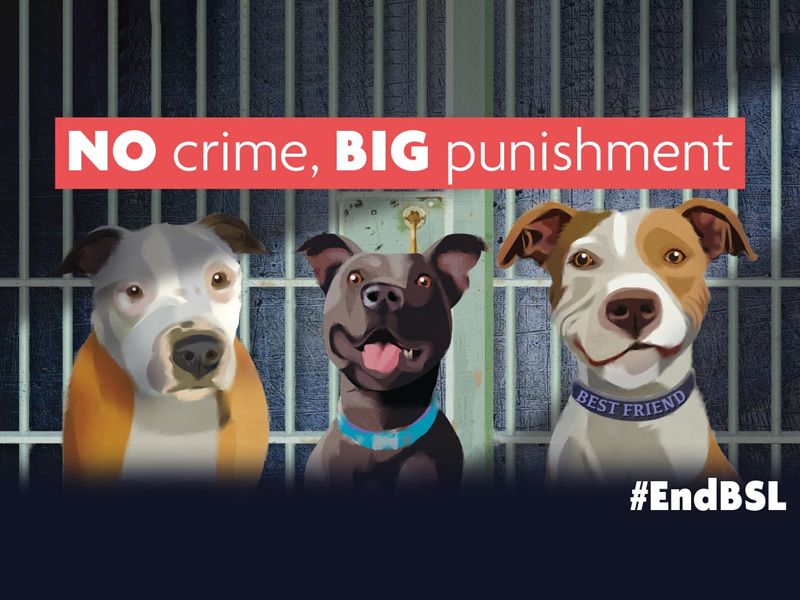Call for urgent end to breed specific legislation
UK’s leading animal groups join forces to call on Government to protect public safety and protect dog welfare.

'These dogs don't deserve to die'
As the Dangerous Dogs Act marks 31 years, UK’s leading animal groups join forces to call on Government to protect public safety and protect dog welfare.
We've teamed up with Battersea, Blue Cross, British Veterinary Association (BVA), The Kennel Club, RSPCA and Scottish SPCA as the Dog Control Coalition to throw their weight behind the #EndBSL campaign.
Friday (August 12) marks the 31st anniversary of the Dangerous Dogs Act; legislation that was introduced in 1991 following a number of serious dog attacks in the UK. While there are parts of the Act that, importantly, protect the public from dogs who are dangerously out of control, the UK’s biggest welfare and veterinary organisations are calling for urgent change to one part of the law which labels certain types of dogs as dangerous purely based on their looks.
Critics of the law - including the country’s leading dog welfare groups, veterinary bodies, dog owners and the public - want BSL repealed and replaced with legislation that better protects public safety and dog welfare, and allows better education to keep people safe around dogs while allowing early intervention to help dogs with behavioural concerns.
A review of dog control policy and legislation in the UK by the Environment, Food and Rural Affairs (EFRA) Committee in 2018 and independent research commissioned by the Government and published by Middlesex University last year also cast further doubt on the basis of BSL, adding more weight to the #EndBSL campaign.
What is breed specific legislation?
BSL was introduced in a bid to crackdown on the number of dog attacks in the UK, but NHS data shows that the number of hospital admissions due to dog-related injuries has increased since it was introduced. In the past 10 years alone, the number of admissions rose 30% from 6,640 to 8,655 (2011-12 to 2021-22).
If a dog is suspected of being of banned type they will be assessed by a police dog legislation officer against a list of breed standards. If they are identified as being of a prohibited type then their owner must apply to have them exempted through the courts and, if approved, must adhere to a strict set of rules such as always keeping them on lead and muzzled when in public.
These dogs cannot be rehomed - meaning rehoming organisations like Battersea, Blue Cross, the RSPCA and Scottish SPCA must heartbreakingly euthanise them - and their ownership cannot easily be transferred to someone else should an owner be unable to care for them.
Deed not breed
Our CEO Owen Sharp said:
“Dogs seized under the Dangerous Dogs Act can spend protracted periods of time in kennels during the court process, often in poor conditions, and too many healthy dogs are put to sleep because they are prohibited and cannot legally be rehomed.
“We believe in ‘deed-not-breed’; dogs should not be judged on what they look like and should have the chance to live a happy life, free from the threat of unnecessary destruction.”
While the main aim of the Dog Control Coalition is to see the repeal of BSL, the group is urgently calling on the Government to change the law with regards to the rehoming of typed dogs - as recommended by the EFRA Committee to avoid the unnecessary euthanasia of happy, friendly dogs.
Help us call for urgent end to breed specific legislation
To help the coalition #EndBSL, please stand up for the dogs on death row and email your MP here:

